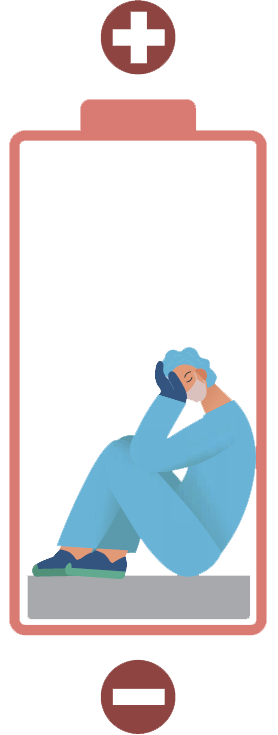Healthcare professionals need to care for themselves, so they can continue to take care of others, especially during the global pandemic.

Based on an article from the AMT Pulse, Spring 2021
Janet Sesser, RMA (AMT) MS (HealthEd)
2020 proved to be the most interesting and devastating year I can recall in my lifetime. Maybe you feel the same way. We may have started January 1, 2020, thinking positively about the future, but, for many, the outlook quickly and significantly changed due to COVID-19, the political environment and elections.
“Compassionate” is an adjective meaning to feel or show sympathy and concern for others, making us want to help. We can all relate to the term “fatigue,” which means extreme tiredness resulting from mental or physical exertion or illness. When we put the two words together, we end up with what many healthcare professionals have experienced this year. Years ago we called this “burnout.” The difference between compassionate fatigue in the year of COVID-19 and caregiver burnout is usually that burnout develops over a longer time period. Compassionate fatigue has affected many in a few short weeks or months this year.
 When this type of fatigue sets in, the person may feel like giving up or saying, “I’m done.” Unfortunately, when the healthcare professional ends their workday and returns to their home and family, they are once again bombarded with the news of new COVID cases, hospitalizations and unfortunate deaths. Like the rest of us, they probably can’t escape the daily updates from TV, radio and smartphones. For many healthcare workers, they are also trying to be the family caregiver— helping kids with online learning, caring for a family member or working remotely.
When this type of fatigue sets in, the person may feel like giving up or saying, “I’m done.” Unfortunately, when the healthcare professional ends their workday and returns to their home and family, they are once again bombarded with the news of new COVID cases, hospitalizations and unfortunate deaths. Like the rest of us, they probably can’t escape the daily updates from TV, radio and smartphones. For many healthcare workers, they are also trying to be the family caregiver— helping kids with online learning, caring for a family member or working remotely.
So how do we deal with this condition of compassionate fatigue? First of all, as with any illness, we need to identify the symptoms. Here are just a few:
- Sleeplessness, insomnia
- Anger and irritability, blaming others
- Isolation, not wanting to be around others
- Losing interest in caregiving duties
- Trouble concentrating
- Avoiding self-care (overeating, substance use/abuse)
Healthcare professionals need to care for themselves, so they can continue to take care of others. As a medical assistant, you may say that you are not on the front lines caring for those with COVID-19. However, you have daily interactions with the families and loved ones who have suffered illness and loss.
How do you take care of yourself?
You start by recognizing symptoms and then dealing with each one of them. You may need to seek professional help or counseling as part of the treatment. No one should ignore that option. We know treatment for most illnesses includes getting plenty of rest, managing nutrition and taking time to pamper the body and soul. Don’t dwell on the “should do,” but focus on the “can do.” We end up stressing too much about the things we “should do.” During the pandemic, we need to focus on the things we can do to make ourselves and others better and able to survive.
Someone years ago taught me this saying, and it has always helped me focus on the things I can do: Do a simple deed of kindness; though its end you may not see, it will reach like widening ripples even to eternity.
Resources:
- synergyhomecare.com/blog/posts/2020/august/relief-for-family-caregivers-hit-withcompassion-fatigue-during-covid-19/
- resiliencyonline.com/2020/10/05/compassion-fatigue-and-covid/